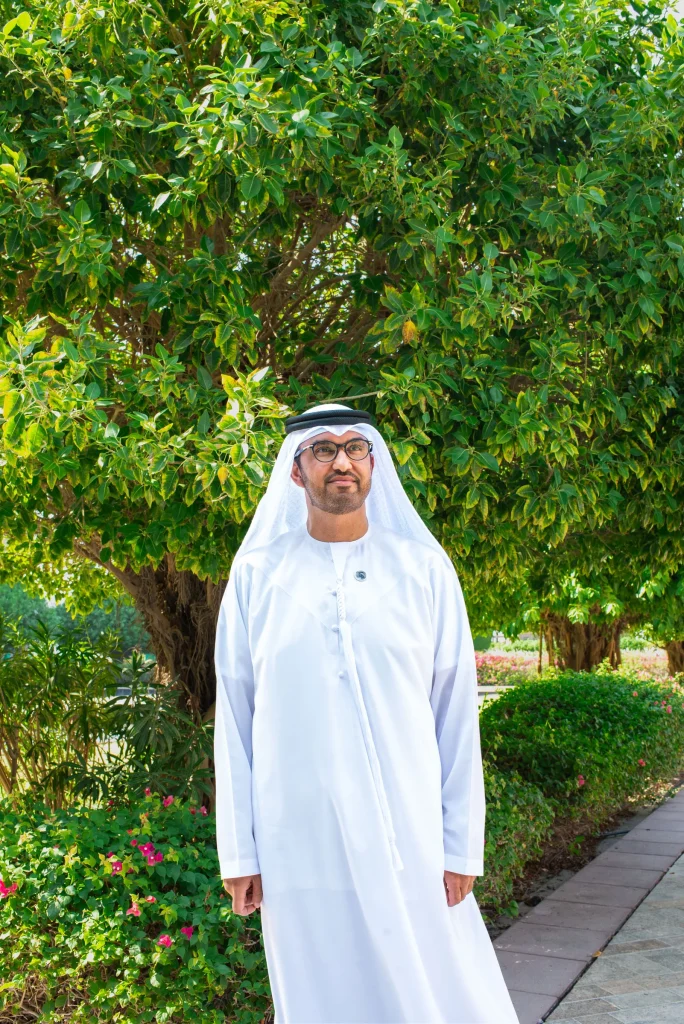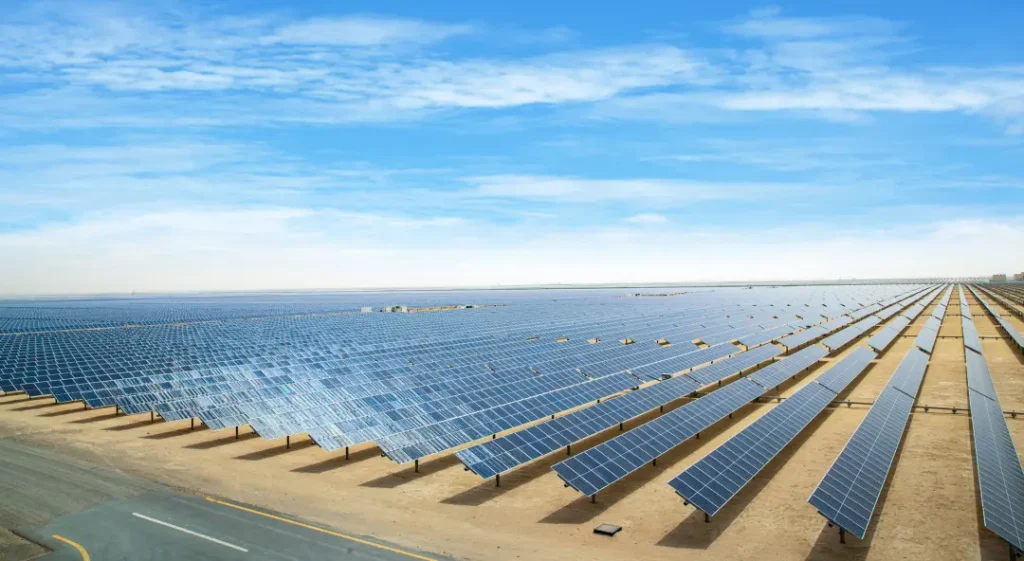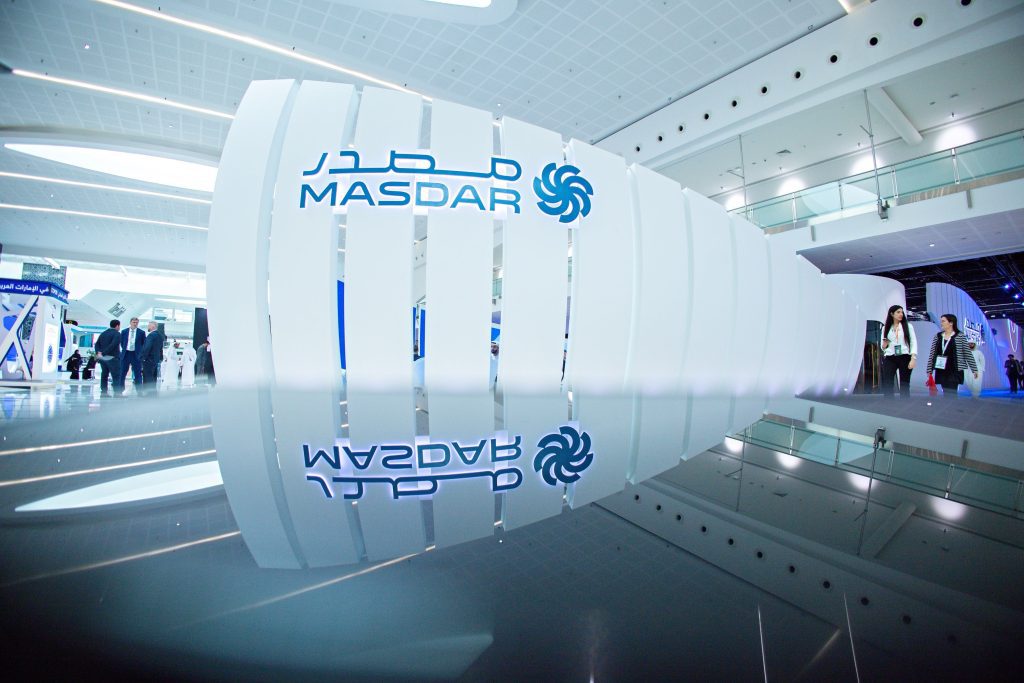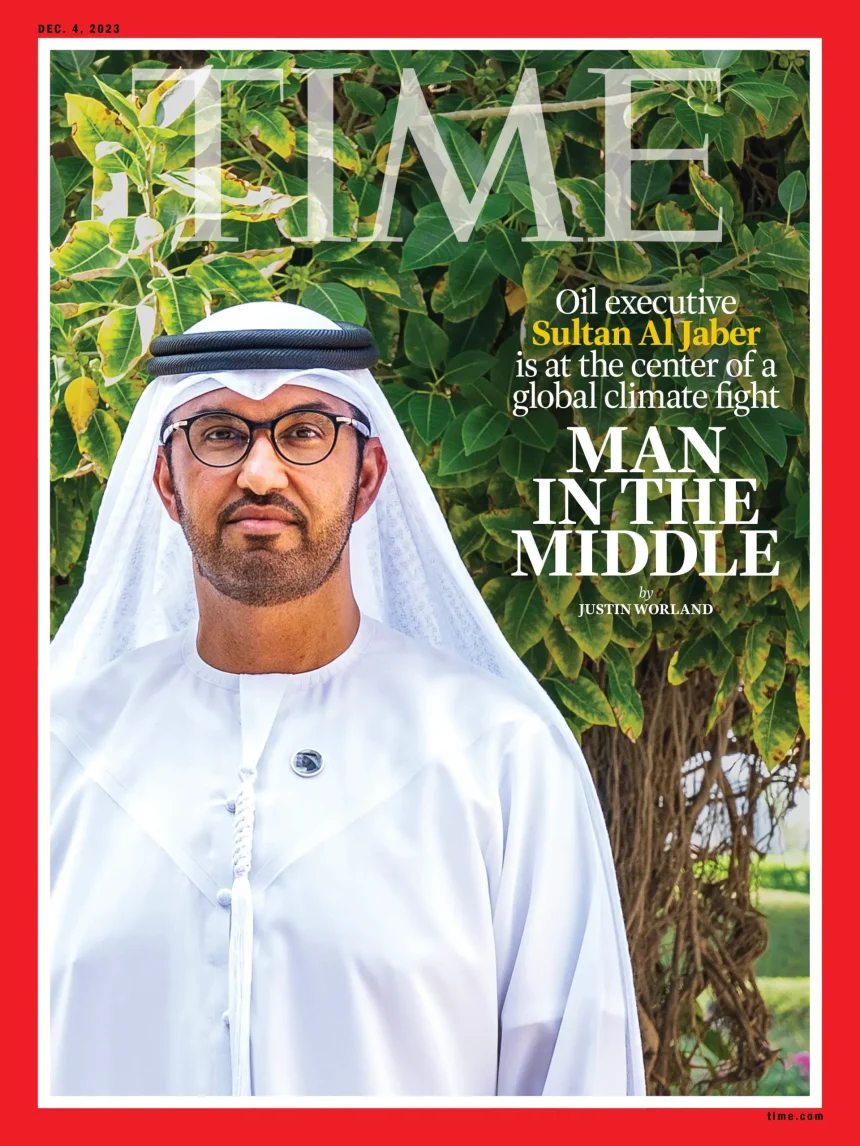Time Magazine is Talking About COP28 President “Sultan Al Jaber”

COP28 President, Sultan Al Jaber, the Ph.D. economist turned renewable-energy executive turned ADNOC CEO.
Who is presiding over the U.N. climate conference to be held in Dubai in December.
The conference, known as COP28, comes as, at the close of the hottest year on record.
Scientific consensus demands that we cut fossil-fuel use right now.
At the same time, money continues to flow into fossil fuels; more than $1 trillion in new funding was invested this year alone.
According to the International Energy Agency (IEA).
COP28 President, Sultan Al Jaber interviewed by Time Magazine at the Emirates Palace hotel .
Al Jaber, as the head of both COP28 and one of the world’s largest fossil-fuel companies, is tasked with reconciling those realities.
Sitting in a meeting room at the Emirates Palace hotel dressed in the traditional white thobe and sneakers.
He is both a target for criticism and a symbol of possibility.
“A phasedown of fossil fuels is inevitable, it is essential,” he tells me.
“We have to accept that.” At the same time, he says, the world is not ready to entirely kick oil and gas.
“We need to get real,” he says. “We cannot unplug the world from the current energy system before we build a new energy system.”
Most years, the COP president plays a largely functionary role.
Shuttling between member countries to find common ground on wonky areas of climate policy.
Al Jaber has taken a very different approach.
He has extended an invitation to oil and gas companies and prioritized private-sector climate solutions.
In Al Jaber’s view, the success of COP28, not to mention the broader efforts to fight climate change, hinges as much on embracing the private sector and shifting market conditions as it does on wonky negotiations.
“There’s going to be a paradigm shift,” he says.
“The political process needs to be well complemented with private capital and a business mindset.”
Success is far from assured.
A “business mindset” doesn’t necessarily map well onto diplomatic negotiations between 200 countries.
And companies—especially those in the oil and gas business—do not have a great track record of following through on climate commitments.
Al Jaber says he’s uniquely positioned to reconcile the many interests in the climate fight.
That debate will define the coming COP summit.
We need to begin to phase out oil and gas while managing the continued dependence of our economic system on fossil fuels.
Al Jaber’s not wrong that that requires cold-eyed realism, but no one knows where his version of realism will lead. In Abu Dhabi.
I sat down with John Kerry, the former U.S. Secretary of State now serving as President Biden’s climate envoy.
He has been supportive of Al Jaber from the beginning, but acknowledges the difficulties.
“It may or may not work,” says Kerry. “Some might call it an experiment to have an oil-and-gas-producing entity host COP. That’s the big question.”
Mohammed bin Rashid Al Maktoum Solar Park.

Looking out the window of the Bell 412 helicopter ferrying me out of Abu Dhabi.
I get a glimpse of the classic vision of the Arabian Desert: a sea of wavy sand dunes stretching as far as the eye can see.
Visible through the other window is a science-fiction-like array of solar panels, covering an area larger than Manhattan.
Tracing the border of the solar park, we descend to get a closer look at the nearly 900-ft.
Tower loaded with molten salt that absorbs and stores the energy from the 70,000 mirrors that surround it.
Al Jaber’s team arranged the ride to Mohammed bin Rashid Al Maktoum Solar Park, among the world’s largest, to showcase the UAE’s climate work.
As impressive as the solar farm is, I’m just as intrigued by the ride to the site.
We lift off from a helipad in Abu Dhabi, getting a stunning, if brief, view of the skyscrapers that have emerged from the desert.
That 60 years ago was an impoverished community suffering from the decline of the pearl-diving trade.
From there, we fly over the Persian Gulf, where I can spot some of the UAE’s offshore oil rigs in the distance.
Contributing to the nearly 3 million barrels of oil the country produces every day.
COP28 President runs ADNOC and serves as the chairman of Masdar.

Al Jaber is at the center of this energy ecosystem.
At age 50, the bespectacled executive runs ADNOC and serves as the chairman of Masdar.
The state-owned company he co-founded that now operates renewable-energy projects in over 40 countries.
When we sit down, he addresses me warmly, and jumps right into his résumé.
He was appointed to run ADNOC in 2016, he says, months after the world had inked the Paris Agreement.
In part to “future-proof” the business amid the global transition away from fossil fuels. “They wanted a smart, progressive disruption,” he says.
Progressive is a relative term.
Al Jaber hasn’t committed ADNOC to cutting its oil production, nor has he charted a path for it to become a renewables company.
Instead, the company is investing more than $150 billion on growth projects.
Including expanding its crude-oil production capacity to 5 million barrels per day by 2030.
A fraction of that money, $15 billion, is dedicated to reducing the emissions that oil extraction will generate.
That said, it has led to some improvement: Offshore oil rigs now run on electricity.
and also digital tools allow the company to map areas where energy is wasted. And the company has begun building big-budget carbon-capture projects.
Source: https://time.com/6335225/sultan-al-jaber-cop28-interview/
Read Also:
Ministry of Industry COP28 Pavilion Hosts 38 Active Tech Entities
COP28 .. All You Need to Know In Case You Want to Be A Part of it





